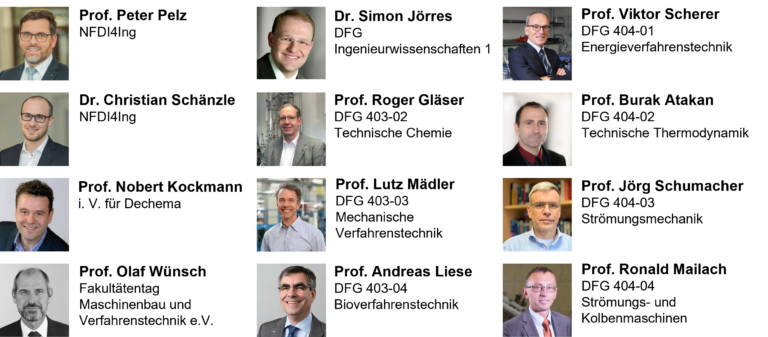In a first meeting, leading scientists in the German communities of thermal engineering and process engineering have met to discuss decentralised data stewards and community expectations towards NFDI4Ing.
Community Clusters in the NFDI4Ing Community
To address the vast and diverse engineering landscape properly, the consortium NFDI4Ing follows the DFG’s classification of engineering research areas. Engineering is divided into five subject areas:
- Mechanical and industrial engineering
- Thermal engineering and process engineering
- Materials science and engineering
- Computer science, systems and electrical engineering
- Construction engineering and architecture
We call these five subject areas “Community Clusters”, and have established task areas that serve as gateways to each particular research community and their needs. Each cluster disseminates the developments and results of the other NFDI4Ing task areas, such as services and best-practices, into the corresponding research communities.
For each of the five Community Clusters, a Community Board consisting of leading scientists from the respective community clusters will be established. This board serves as a multiplier and supports the dissemination of practices to the community as well as relaying needs from the community into the consortium. The Community Cluster 42 – Thermal engineering and process engineering – organized its annual Community Meeting in a compressed form focusing on the initiation of its Community Board.
For NFDI4Ing to be successful, their communities shall know, use and evaluate the consortium’s work. This includes the status quo of developed, disseminated, standardised and provided methods and services to make engineering research data FAIR.
The Community Board of Cluster 42
The Community Board and its members are meant to represent the full range of the Community Cluster 42, spanning Thermal and Process engineering, which includes the DFG’s current review boards 403 (Process Engineering, Technical Chemistry) and 404 (Fluid Mechanics, Technical Thermodynamics and Thermal Energy Engineering).

Structure of Cluster 42’s Community Board
In addition to members of each of the review board’s subject areas, the FMTV (Fakultätentag für Maschinenbau und Verfahrenstechnik) as well as the VDMA (Verband Deutscher Maschinen- und Anlagenbauer) and DECHEMA (Dechema Gesellschaft für Chemische Technik und Biotechnologie e.V.) have seats in the community board.

Members of the Community Board
Rights to the portraits lie with each portrayed member.
Opening the Community Board
On Monday, 6th December the Cluster 42’s Community Board members met virtually for the opening session. In addition to the presentation of current NFDI4Ing activities, the meeting focused on two rounds of split group work and discussion,
Key Performance indicators
The first round dealt with key performance indicators (KPIs) for NFDI4Ing from a community perspective. In split groups, KPIs for the areas of growth and awareness, events and publications, networking and services were collected and discussed afterwards. While the number of publications, released services or organized events, along with their growth is a generally useful indicator, quality of measures is important and must be assessed. Especially when looking at provided services, the ease of use and integration level outweigh other aspects. This means continued usage and usage of services in finished projects retrospectively, for example as mentions in final reports, are carrying more weight than simple number of downloads. Furthermore, the new Journal FAIR Data Management in Engineering Sciences ing.grid met with great resonance. This gives the chance to highlight and credit research data management solutions to scientists.
Data Stewards
The second discussion addressed the concept of decentralised data stewards.
Key points were the necessity of data stewards in joint projects like collaborative research centres, which cooperate with NFDI consortia. On the other hand, smaller projects face bigger challenges implementing research data management due to missing support of data stewards. This is where NFDI consortia might take action. This includes the establishment of networks for data stewards and to implement train the trainer concepts for scientists.
Whereas access to infrastructure and support for research data management must be available for small to large projects, redundancy and dual funding needs to be avoided. This concerns the multiple consortia within NFDI as well as separate research data management organizations.
Data Stewards employed for large scale or collaboration projects will become a common standard, but small cale projects will need to rely on services provided by consortia like NFDI4Ing or local institutions. Universities and libraries are increasingly setting up central offices for data stewards, offering support and advice. The lack of subject specific expertise can pose a challenge, both for their individual work as well as acceptance of the concept.
Curious? Find the community!
The Community Hub strives to give you access to everything important. Find contact forms, FAQs or first services there.
Find out about the Journal’s unique concept on inggrid.org.
M. Hock, C. Schänzle
